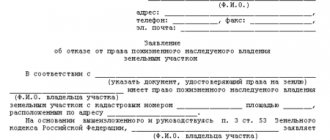Having your own land is a sign of prosperity and a wise investment. Houses are built on it for permanent residence and for seasonal stay, the land is used for vegetable gardens and for other agricultural needs. In this regard, the topic of inheriting a house and the land plot under it by law constantly arouses understandable interest.
This possibility is regulated by the regulatory standards of the Russian Federation. The allotment serves both as real estate and a natural resource that guarantees the livelihoods of people, and is therefore protected by the state on the basis of Art. 130 Civil Code of the Russian Federation.
As real estate, land can be transferred or alienated. To qualify for the estate, the property must be registered, and the condition of lifelong inheritable personal ownership of a specific plot of land must be met.
The concept of land inheritance
The presence of land is a sign of family prosperity. Residential buildings and country houses are built on the land, and it is used for gardening and horticulture, as well as farming. Therefore, issues of inheritance of land plots are of such interest.
The possibility of inheriting land ownership and the features of this procedure are regulated by land and civil legislation.
A land plot is both real estate and a natural resource that ensures the livelihoods of citizens and, accordingly, is under state protection (Article 130 of the Civil Code of the Russian Federation).
As a piece of real estate, land can be alienated and passed on by inheritance. A land plot can fall into the inheritance mass if it was in the property or lifetime possession of the testator.
Fees and benefits when issuing a certificate by a notary
Costs in a notary office are divided into two categories:
- State duty, the amount of which is determined by the degree of relationship with the testator and the value of the property. According to paragraph 22 of Art. No. 333.24 of the Russian Tax Code, the heirs of the first two stages will have to pay 0.3% of the value of the land plot they inherit, but not more than 100 thousand rubles. Other relatives and persons specified in the will will pay 0.6% of the value of the inherited land, but not more than 1 million rubles.
- Costs for UPTH charged by the notary conducting the inheritance case. Their value depends on regional prices, however, on average throughout the country, the amount of UPTH ranges from 3 to 8 thousand rubles.
The Tax Code applies to certain categories of citizens either a complete exemption from paying the notary fee, or a partial exemption in the form of 50% of the established amount.
Persons who lived together with the testator do not have to pay state fees when inheriting according to the law.
To be exempt from paying state fees, citizens must submit to the notary office a certificate confirming cohabitation with the testator, certified by the organization that issued it:
- housing maintenance office (ZhEK);
- management company (MC);
- MFC;
- Passport Office;
- local administration.
Features and procedure for inheriting land plots
A plot of land can become part of the estate if the deceased could dispose of it as property or had the right to lifelong use. In order to inherit land, apart from the above conditions, no additional permits are required.
As an inheritance, the land is transferred to the heir only with the scope of rights belonging to the testator, with the soil layer, trees growing on it, forest area, etc. Some types of land plots (garden, country houses, etc.) cannot be transferred by will. .).
Inheritance of land in accordance with Art. 1181 of the Civil Code of the Russian Federation occurs on a general basis without additional permits. The peculiarities of inheritance of land plots lie in the different intended purposes of land plots, the mode of their use and protection.
Legal regulation of certain types of plots is carried out by various regulations.
Inheritance of land plots can occur by law or by will.
Land division - when necessary
Not all testators have a sufficient number of land plots to transfer them to each of their heirs.
Art. 1146 of the Civil Code of the Russian Federation “Inheritance by right of representation” indicates that by inheritance, land, like other things, is transferred to all heirs in equal quantities. At the same time, Art. 1158 of the Civil Code of the Russian Federation “Refusal of inheritance in favor of other persons...” says that when inheriting property - in particular, land plots - refusal of one thing from the inheritance in favor of another is not allowed.
The peculiarity of inheriting land is the possibility of its division. This is done so that all heirs can receive a part of the testator’s common plot.
Registration of inheritance rights to a land plot
To register rights to an inherited plot, after receiving a certificate from a notary, you must submit the appropriate application and documents that were provided to the notary as a substantiation of the requirement when receiving a certificate of inheritance (cadastral plan or extract from the plan, certificate of ownership and land title documents ) to the territorial department of the UFSGR (Office of the Federal State Registration Service), in order to obtain a certificate of state registration. registration of property rights.
However, if it is necessary to carry out the land surveying procedure and determine the clear dimensions of the land, you need to contact a geodetic company and coordinate on the ground the actual boundaries of your land with neighboring plots.
Then, based on the data obtained, the initial dimensions of the allocated area are specified. After coordination with neighbors and the local administration, the cadastral engineer provides the heir with a land survey plan and an extract from the cadastral plan, which are submitted to the UFSGR. Within 30 days, a certificate of ownership of the land must be issued.
The legislator has established a period of six months for the opportunity to declare acceptance of the inheritance by all heirs. To do this, you need to submit an application to the notary to accept the land as an inheritance, after which he opens an inheritance case and, after a six-month period, issues a certificate of inheritance of the land.
Documents for inheriting a land plot
To register land as an inheritance after the death of the testator, it is necessary that the heir submit documents to the notary within the period established by law in the place where the inheritance was opened.
The standard list of documents that is submitted in all cases of inheritance includes:
- death certificate of the owner of the land (testator);
- a certificate from the place of residence where the testator lived before his death;
- a will or documents that can confirm the relationship between the applicant and the deceased;
- heir's passport.
In order to issue a certificate of inheritance rights to land, you need to provide the notary with the following documents:
- documents confirming ownership of an inherited plot of land (confirming the grounds for the emergence and exercise of ownership or lifelong use of land);
- state certificate registration of land rights (if any);
- documents containing information about the valuation of the land on the day when the inheritance was opened.
How to register
Registration of the legal rights of an heir contains the following steps:
- provision of a set of documents;
- checking documents for their authenticity and legality;
- adding information to the Unified State Register;
- issuing documents to citizens that indicate registration of ownership of a plot of land.
This procedure is considered completed when the Unified State Register entries are made and the certificate is issued to the citizen.
The Federal Law “On state registration of rights to real estate and transactions with it” regulates the list of documents required for state registration:
- application for registration and issuance of a certificate;
- the applicant’s personal passport or power of attorney;
- confirmation of the basis of ownership and a plan of the territory;
- receipt of payment of state duty.
A set of documents must be submitted to the local authorities of Rosreestr upon the discovery of the inheritance mass. MFCs are authorized organizations whose functions are to receive and issue documents to citizens. But they have no legal authority to take legal action and cannot register property.
Inheritance of divisible and indivisible land plots
Land plots are defined by law as part of the Earth's surface. Its boundaries are described and certified in the prescribed manner.
Land plots can be divisible and indivisible.
Divisible plots include plots that can be divided into parts, each of which, in the event of division, forms a separate independent plot of land. Moreover, its use must be permitted based on the rules that regulate the use of this particular category of land without transferring it to another category of land.
The size of the heir's share in the event of its inheritance cannot be less than the size of the plot that is established for its intended use. If this is not possible, then the plot is not subject to division, since the division of lands, based on their intended purpose into categories, is the main principle of land law.
Which plots cannot be divided between heirs
Not all plots can be divided during inheritance. Only divisible things are allowed to be divided. Divisibility means that, in the event of division, the allocated portion of the land will be able to be used for its intended purpose, and that each owner will have his own driveway or passage.
The minimum allotment of land when dividing a common plot directly depends on the purpose of its use - for building a house, a vegetable garden, for rural needs. The laws of each individual region of Russia provide for different maximum sizes.
Reference. In the Irkutsk region, the allocation of land plots for individual housing construction in an amount of less than 400 m² and more than 1500 m² is not allowed. In the Moscow region, these sizes will be larger - from 600 m² (lower limit) to 0.5 hectares (upper limit).
Such requirements for the size of plots are established to prevent excessive fragmentation of plots and their strong consolidation. Each person should be able to cultivate the amount of land that he received as property.
The purpose of the plots also affects the ability to use them later in a certain number of square meters. It is physically impossible to build a house on a small plot of land, less than four acres.
An important circumstance is the availability of free access to each of the allocated areas after division . Often, after dividing the plots, it turns out that the passage remains only to one of them - and there is no other access, only through the adjacent one, which already belongs to another person.
Such situations give rise to disputes, which then result in litigation. Therefore, already at the stage of formation of plots by cadastral engineers, the issue of access to them is one of the first to be resolved. And if it is not there, then the section will most likely be refused.
Inheritance of land plots by right of ownership
The procedure on the basis of which land is inherited is established by the provisions of Article 1181 of the Civil Code of the Russian Federation. In accordance with this rule of law, the plot owned by the testator by right of ownership is inherited on a general basis. That is, citizens can, by inheritance, obtain ownership of a land plot, both by law and by will.
Since land with perpetual use rights cannot currently be inherited, ownership rights only to buildings that are located on such land are inherited.
The plot of land is transferred to the new owner - the heir in accordance with the rules of Art. 35 of the Land Code of the Russian Federation. Moreover, the right to free registration of such a plot of property also passes to him.
Legal services of a Land Lawyer!
Land Lawyer (Lawyer) FREE ONLINE!
You can, without leaving your computer:
- Using one of the messengers;
- Fill out the call back form available at the end of the text you are reading;
- Fill out the written question form by following this link >>>
Address and Telephone of the Land Lawyer (Lawyer)
The Legal Office is located directly next to the Izmailovo (MCC) or Partizanskaya metro stations, across the street from the exit. Excellent transport accessibility will save your time and money on travel by public transport.
We are also easy to reach by car, since the office is located along the North-East Expressway, a new highway that connects three districts of the capital: north, east and south-east.
Office hours of a Lawyer (Advocate) on Land issues
Inheritance of land plots on the right of lifelong inheritable ownership
According to the provisions of Article 1181 of the Civil Code, a land plot can be inherited if it belonged to the testator on the basis of a special right - lifelong inheritance. Such inheritance occurs on a general basis.
The subjects of such right include persons to whom land was provided free of charge, and only from those lands that are in state or municipal ownership.
Land acquired on the basis of the right of lifelong inheritable ownership may be provided:
- to persons in the form of a plot of land that is used to conduct subsidiary personal farming;
- persons who wished to organize a peasant or farm enterprise and left the agricultural organizations to create such farms.
The division of a plot received as an inheritance and owned by the testator with the right of lifelong inheritance is not provided for by law.
Article 21 of the Land Code of the Russian Federation on lifelong inheritable ownership of land plots has lost force since March 1, 2015 (Law dated June 23, 2014 N 171-FZ).
Legal advice from a Land Lawyer for FREE!
Inheritance of land plots
Plots of land can belong to citizens both on the right of ownership and on the right of lifelong inheritable possession.
As provided for in Article 1181 of the Civil Code of the Russian Federation, a plot of land owned by the testator or the right of lifelong inheritable ownership of a land plot is included in the inheritance and is inherited on a general basis. To accept an inheritance that includes the specified plots of land, no special permissions are required. The inclusion of this norm in Chapter 65 of the Civil Code of the Russian Federation, dedicated to the peculiarities of inheritance of certain types of property, is caused primarily by the fact that plots of land were introduced into civil circulation relatively recently - the Civil Code of the RSFSR of 1964 did not regulate the procedure for their inheritance.
Category and permitted use of land upon inheritance
Plots of land have not only different purposes, permitted modes of use and protection, size restrictions for one person, but also different regulatory frameworks for legal regulation. Moreover, some of the laws and by-laws at the time of the adoption of part three of the Civil Code of the Russian Federation contained special rules of inheritance, as well as a significant number of detailed and technical norms related to the registration of inheritance rights. Therefore, it was important in such a law as the Civil Code of the Russian Federation to provide that, despite all the differences and features, plots of land are inherited without any exceptions from the general inheritance order.
The intended purpose, permitted mode of use, etc., which are established by land legislation and other regulations, certainly matter and must be taken into account, but only after inheritance rights have been formalized. In particular, when a plot of land becomes the property of a foreign citizen or a stateless person to whom it cannot belong, current legislation provides for the possibility of alienation of this plot (Article 258 of the Civil Code of the Russian Federation, Articles 3 and 5 of the Law “On the Turnover of Agricultural Land”) .
What is a Land Plot
The Civil Code, although it regulates in some detail the right of ownership and other real rights to land, nevertheless does not contain a normative definition of a plot of land. This definition is given in Article 6 of the Land Code of the Russian Federation as part of the Earth’s surface (including the soil layer) within the boundaries that are described and certified in the prescribed manner. A slightly different, broader concept of a plot of land was given in the Federal Law “On the State Land Cadastre”: this is a part of the Earth’s surface (including the surface layer), the boundaries of which are described and certified in the prescribed manner by an authorized state body, as well as everything that is located above and below the surface of a piece of land.
Minimum limits for the provision of land plots
From the content of the above norms it follows that a plot of land is always individualized on the ground when it is allocated, representing a specifically defined thing, and is characterized by such characteristics as location, size and boundaries of which are described and certified in the manner prescribed by law. The establishment of maximum (maximum and minimum) standards for the provision of plots of land from among the lands in state or municipal ownership to citizens for running a peasant (farm) economy, gardening, truck farming, dacha construction is within the competence of the subjects of the Russian Federation, and for running a personal subsidiary plot — local government bodies (Article 33 of the Land Code of the Russian Federation).
Total share ownership of the land plot
In cases where the right to a plot belongs to several persons, the inheritance will be a share in the right of common ownership of a plot of land, including land shares received during the privatization of agricultural land before the entry into force of the Federal Law “On the Turnover of Agricultural Land” (Article 15), - of course, provided that the land share was not included in the authorized capital of the agricultural enterprise.
Documents confirming rights to a land plot
According to Article 261 of the Civil Code of the Russian Federation, the territorial boundary of a plot of land is determined in the manner established by land legislation, on the basis of documents issued to the owner by the relevant authorities. In turn, what documents should confirm the rights to a plot of land, the Land Code does not answer, referring to the Federal Law “On State Registration of Rights to Real Estate and Transactions with It” (Article 26 of the Land Code), Article 17 of which is one of them refers:
- Acts of public authorities;
- Acts of local government bodies;
- Agreements and other transactions in relation to a land plot or buildings located on it;
- Acts (certificates) on the privatization of real estate;
- Certificates of right to inheritance;
- Judicial acts that have entered into legal force.
From this list, documents related to the administrative and legal way of the emergence of citizens’ rights to plots of land deserve special attention.
It was in this order that the Land Code of the RSFSR of 1991, decrees of the President of the Russian Federation and decrees of the Government of the Russian Federation provided for the possibility of:
- Providing free plots of land for ownership or inheritable lifelong ownership to citizens;
- Re-registration of plots of land previously provided for their use.
Thus, in the period from April 25, 1991 to October 27, 1993, acts on the provision of land plots were issued by local Councils of People's Deputies, and then their powers began to be exercised by the corresponding local administrations. The Decree of the Government of the Russian Federation dated March 19, 1992 provided for the issuance of temporary certificates of ownership of a plot of land. After October 27, 1993, in accordance with the Decree of the President of the Russian Federation dated October 27, 1993, documents confirming ownership of a plot of land were subject to registration with the Committee on Land Resources and Land Management. Previously issued state acts and certificates granting ownership of plots of land were declared permanent and having equal legal force with the certificate provided for by the Decree of the President of the Russian Federation of October 27, 1993.
Thus, when registering inheritance rights, ownership of a plot of land can be confirmed in the following cases:
- Resolutions of local Councils of People's Deputies in the period from April 25, 1991 to October 27, 1993 and temporary certificates issued on the basis of them, the registration of which was not provided for;
- Resolutions of the heads of local administration, starting from October 27, 1993, registered with the land committee or with justice institutions for state registration of rights.
Lack of registered rights to land
Failure to comply with state registration requirements greatly complicates the heirs’ registration of their rights to a plot of land.
As provided for in paragraph 2, Article 8 of the Civil Code, rights to property subject to state registration arise from the moment of registration of the corresponding rights to it, unless otherwise provided by law.
It is clear that with this approach, the notary, guided by Article 48 of the Fundamentals of Legislation on Notaries, does not have the right to include in the inheritance mass plots of land in respect of which the title documents were not registered in the prescribed manner, that is, with the Committee on Land Resources and Land Management or with the justice authorities , excluding the period when such registration was not carried out at all (from 03/19/1992 to 10/27/1993).
Proving rights to a land plot in court
Judicial practice, while sharing this position, at the same time proceeds from the fact that the rights of heirs in these cases can be protected in court.
If there is no dispute about the right, then a court decision is sufficient for the notary to establish the fact of ownership of the land plot by the testator. If there is a dispute about the ownership of a plot of land, it can be positively resolved through a lawsuit, followed by state registration on the basis of an appropriate court decision.
Shares (shares) on land plots of former agricultural enterprises
The courts experience significant difficulties in resolving disputes related to the ownership of land shares (shares) by former employees of reorganized agricultural enterprises. This is largely due to the fact that the regulatory framework for the reorganization of enterprises in the agricultural complex (state farms and collective farms) was formed gradually and was distinguished by a multiplicity of regulations that were not sufficiently coordinated with each other.
The possibility of privatization of lands of former collective farms and other agricultural enterprises was provided for by Articles 8 and 9 of the Land Code of the RSFSR of 1991. In practice, the process of privatization of agricultural lands began with Decree of the President of the Russian Federation No. 323 of December 27, 1991 “On urgent measures to implement land reform in the Land Code "and adopted by the Government of the Russian Federation in its development of Resolutions No. 86 of December 29, 1991 “On the procedure for the reorganization of collective farms and state farms” and No. 708 of September 4, 1992 “On the procedure for the privatization and reorganization of enterprises and organizations of the agro-industrial complex.” The collective and state farms operating at that time had to carry out the reorganization themselves by 01/01/1993, and the newly formed enterprises as a result of this reorganization had to register their organizational and legal form.
At the same time, members of the reorganized farms (by decision of the labor collective, also pensioners, social workers, etc.) were endowed with property and land shares, which they could receive in kind upon leaving the farm or contribute them to the authorized capital or share fund of newly formed agricultural organizations .
Subsequently, a number of regulatory legal acts were adopted, which prescribed:
- Issuing to all owners of land shares, upon their application, certificates of ownership of the land share in the form approved by Decree of the President of the Russian Federation of October 27, 1993 No. 1767;
- In the case of transfer of land shares to the authorized capital of an agricultural organization, conclusion of relevant written agreements (contracts) (Decree of the President of the Russian Federation No. 337 of 03/07/1996, Decree of the Government of the Russian Federation No. 96 of 02/01/1995).
However, by this time the reorganization of enterprises in the agricultural complex was already largely completed. Nevertheless, many of those workers who disposed of their land share and lost the right to it were issued certificates of ownership of the land share by the land resources and land management committees without the necessary verification. Therefore, such a certificate in itself does not indisputably confirm the testator’s right to a land share.
Documents confirming the right to a land plot
When resolving this type of dispute, judicial and notarial practice correctly proceeds from the fact that in order to formalize inheritance rights the following must be presented:
- Decision of the general meeting of the team on the reorganization of the agricultural enterprise;
- List of participants in shared ownership;
- Decision of local government bodies on the transfer of agricultural land into common ownership;
- Land plot plan;
- Certificate of ownership of the land share, issued in accordance with Decree of the Government of the Russian Federation No. 177 dated March 19, 1992 or with the decree of the President of the Russian Federation dated October 27, 1993;
- A certificate from an agricultural enterprise stating that the land share was not included in the authorized capital.
All of the listed documents are indeed necessary to resolve the issue of issuing a certificate of inheritance, and subsequently during state registration of rights to a land share by the justice authorities. Without these documents, it is impossible to say with certainty who is the owner of the disputed land share at the time of opening of the inheritance.
Title documents for the land plot
At the same time, in the exact meaning of this word, only an act of local government bodies on the transfer of land into common ownership can be classified as establishing rights. The decision of the general meeting of the labor collective on the circle of persons entitled to a land share and its size served only as the basis for making this decision in local government bodies. The foregoing follows from the Recommendations for the preparation and issuance of documents on the right to land shares and property shares, approved by the Decree of the Government of the Russian Federation dated 02/01/1995, paragraph 18 of which the moment of emergence of ownership of a land share is determined by the date the district administration made a decision to transfer the land into common ownership participants (members) of an agricultural commercial organization (enterprise).
This conclusion is fully consistent with Article 8 of the Civil Code, which contains a list of grounds for the emergence of civil rights and obligations, including such as an act of local government.
Certificates of ownership of land
Certificates of ownership of land shares, issued on the basis of the Decree of the President of the Russian Federation dated October 27, 1993, were intended to consolidate and certify the already existing rights of former employees of reorganized collective and state farms, therefore they can be considered as title-affirming or title-certifying documents.
The procedure for registering ownership of a land plot
The procedure for obtaining ownership of plots of land is currently determined by Federal Law No. 101 - Federal Law of July 24, 2002 “On the turnover of agricultural land”, which does not provide for the free transfer of ownership of plots of land. In connection with the adoption of this Law, as well as a number of others (No. 193 - Federal Law of December 8, 1995 “On Agricultural Cooperation” and No. 178 - Federal Law of December 21, 2001 “On the Privatization of State and Municipal Property”), all of the above Resolutions of the Government of the Russian Federation on the reorganization of state and collective farms have lost force and cannot be applied, even if the reorganization was not carried out at the time.
If there was no reorganization of the agricultural enterprise
In the Supreme Court of the Russian Federation, Applicant A attempted to challenge the correctness of the loss of the Decrees of the Government of the Russian Federation related to the reorganization of agricultural enterprises. At the same time, Applicant A in his statement referred to the fact that, being an employee of the state farm, he was actually deprived of the right to the property of the state farm in the form of a property and land share, since the reorganization of the farm was not carried out. Having considered the case at first instance, the Supreme Court of the Russian Federation, by its decision dated March 13, 2003, rejected the application. Among other arguments that served as the basis for refusing Applicant A’s request, the Supreme Court indicated that Applicant A, as an employee of a state farm, could exercise his right to a free plot of land only when it was reorganized in accordance with the legislation in force at that time.
If the state farm has not been reorganized, then its property is state property. And in accordance with Article 217 of the Civil Code of the Russian Federation and Federal Law No. 178 - Federal Law of December 21, 2001 “On the Privatization of State and Municipal Property,” the transfer of land plots into the ownership of citizens is provided only for a fee.
A similar approach should be taken to resolving disputes regarding claims of citizens against the local administration to force the adoption of resolutions on the reorganization of agricultural enterprises and the allocation of land shares to the workers of these farms. For this purpose, a time frame was determined, beyond which, regardless of the reasons, such a reorganization, taking into account the new legislation, is excluded.
Inheritance of a land plot and a building located on it
Among the basic principles of land legislation, subparagraph 5, paragraph 1, article 1 of the Land Code of the Russian Federation proclaims such a principle as the unity of fate of a plot of land and objects firmly associated with it, according to which all such objects follow the fate of plots of land, with the exception of cases established federal laws.
In development of this principle, Article 35 of the Land Code of the Russian Federation contains a ban on the alienation of a plot of land without buildings and structures located on it if they belong to one person. At the same time, paragraph 3, Article 3, of the Land Code emphasizes that property relations regarding the ownership, use and disposal of land plots, as well as transactions with them, are regulated by civil legislation, unless otherwise provided by land legislation.
All these provisions of the Land Code of the Russian Federation do not affect the general rules of inheritance of plots of land provided for by the Civil Code of the Russian Federation. From the point of view of civil law, plots of land and buildings cannot be considered as a thing and accessory, and also as a complex thing in the form of a single whole. There is, of course, a certain connection between them, which, in accordance with Article 35 of the Land Code, must be taken into account when alienating buildings and plots of land. However, these are independent objects of civil circulation (Article 130 of the Civil Code). Therefore, the will remains valid even if the testator made separate orders regarding the building and the plot of land at his own discretion.
In addition, it should be noted that subparagraph 5, Article 1 of the Land Code, which enshrines the principle of the unity of fate of a plot of land and objects firmly associated with it, contains the clause “except for cases established by federal laws.” Such an exception can be considered the section of the Civil Code “Inheritance Law”, the norms of which do not contain any restrictions on the disposal of land and buildings by a citizen in the event of his death.
There is nothing extraordinary in the situation when ownership of a plot of land and a building passes to different persons. The exit from it is sufficiently regulated by Chapter 17 of the Civil Code. The court, when resolving a dispute between the owner of real estate located on a land plot and the owner of this plot, taking into account the specific circumstances of the case, may recognize the right of one or the other party to acquire the property of another party to the conflict or establish conditions for the use of the land plot by the owner of the property for a new period (Article 272 Civil Code).
Inheritance of a share in the right of common ownership of land plots
In cases where a share of a land plot in common shared ownership is inherited, this occurs without any special features. This also applies to land shares.
If a participant in the common joint property dies, the heir cannot formalize the right of inheritance until the share that the deceased had in the common property is determined.
According to the law, inheritance without determining shares is possible only in cases where the heirs are members of farms or spouses (Articles 256, 257 of the Civil Code of the Russian Federation).
The regulation of controversial issues regarding the distribution of shares between heirs occurs according to the rules of legislation that regulates legal relations between the subjects of the dispute.
Inheritance of leased land
In order to inherit the rights to lease a plot of land, you need to know about the existence of some features of such inheritance.
If there are provisions in the lease agreement concluded with the testator for its termination in the event of the death of the tenant or lessor, the right to lease is not inherited.
The absence of such a clause means that the agreement continues in force and gives the heir the right to lease the land. In this case, the lessor has the right to make adjustments to the agreement.
Inheritance of the right to rent is carried out according to a testamentary document or, if there is none, by law.
If the heir does not exercise his right and does not inherit the leasehold right, then the land is returned to the municipality.







